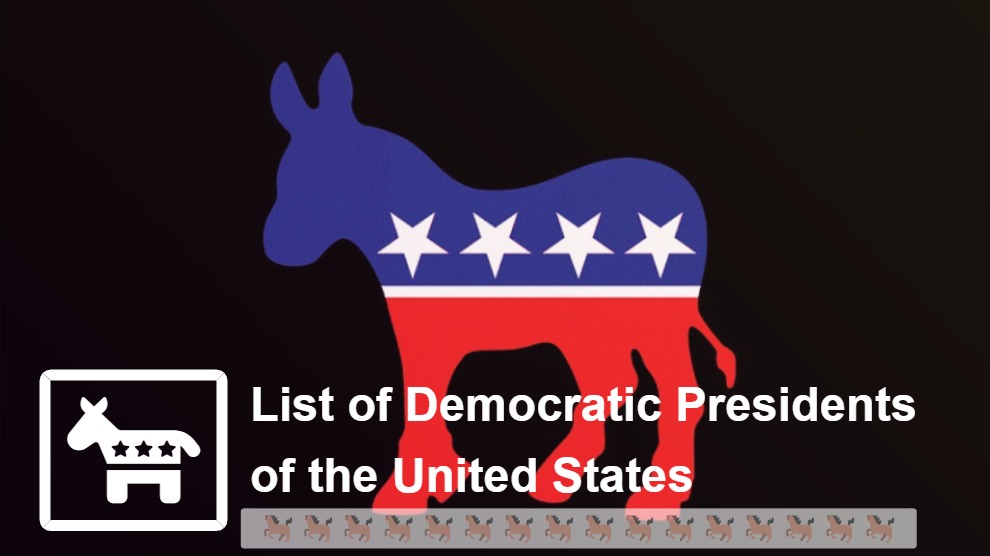
US Democratic Presidents List in Order is available online, you can now check list of democratic presidents of the United States of America of all time. The Democratic Party is one of the two major political parties in the United States, alongside the Republican Party. The Democratic Party traces its origins back to the Democratic-Republican Party, founded by Thomas Jefferson and James Madison in the 1790s. The party evolved and underwent several transformations throughout history.
The Democratic Party generally supports progressive and liberal policies, advocating for social and economic equality, government intervention in the economy, civil rights, environmental protection, and expanded access to healthcare and education. Over the years, the party has represented a broad coalition of various groups, including labor unions, racial and ethnic minorities, women, young voters, and the LGBTQ+ community.
US Democratic Presidents List in Order
There have been several Democratic presidents in the history of the United States. Here is a list of the Democratic presidents along with their respective terms in office:-
| No. | President Name (Lifespan) | State | Presidency Start Date to Presidency End Date | Tenure |
|---|---|---|---|---|
| 7 | Andrew Jackson (1767–1845) | Tennessee | March 4, 1829 to March 4, 1837 | 8 years, 0 days |
| 8 | Martin Van Buren (1782–1862) | New York | March 4, 1837 to March 4, 1841 | 4 years, 0 days |
| 11 | James K. Polk (1795–1849) | Tennessee | March 4, 1845 to March 4, 1849 | 4 years, 0 days |
| 14 | Franklin Pierce (1804–1869) | New Hampshire | March 4, 1853 to March 4, 1857 | 4 years, 0 days |
| 15 | James Buchanan (1791–1868) | Pennsylvania | March 4, 1857 to March 4, 1861 | 4 years, 0 days |
| 17 | Andrew Johnson (1808–1875) | Tennessee | April 15, 1865 to March 4, 1869 | 3 years, 323 days |
| 22 | Grover Cleveland (1837–1908) | New York | March 4, 1885 to March 4, 1889 | 4 years, 0 days |
| 24 | Grover Cleveland (1837–1908) | New York | March 4, 1893 to March 4, 1897 | 4 years, 0 days |
| 28 | Woodrow Wilson (1856–1924) | New Jersey | March 4, 1913 to March 4, 1921 | 8 years, 0 days |
| 32 | Franklin D. Roosevelt (1882–1945) | New York | March 4, 1933 to April 12, 1945 | 12 years, 39 days |
| 33 | Harry S. Truman (1884–1972) | Missouri | April 12, 1945 to January 20, 1953 | 7 years, 283 days |
| 35 | John F. Kennedy (1917–1963) | Massachusetts | January 20, 1961 to November 22, 1963 | 2 years, 306 days |
| 36 | Lyndon B. Johnson (1908–1973) | Texas | November 22, 1963 to January 20, 1969 | 5 years, 59 days |
| 39 | Jimmy Carter (born 1924) | Georgia | January 20, 1977 to January 20, 1981 | 4 years, 0 days |
| 42 | Bill Clinton (born 1946) | Arkansas | January 20, 1993 to January 20, 2001 | 8 years, 0 days |
| 44 | Barack Obama (born 1961) | Illinois | January 20, 2009 to January 20, 2017 | 8 years, 0 days |
| 46 | Joe Biden (born 1942) | Delaware | January 20, 2021 to Present | Incumbent |
Key Policy of Democratic Party
Some key policy positions associated with the Democratic Party include:-
- Affordable healthcare: The party has traditionally supported expanding access to healthcare, with initiatives like the Affordable Care Act (ACA), also known as Obamacare.
- Social safety net: Democrats often advocate for social programs aimed at helping the disadvantaged, such as welfare, food assistance, and unemployment benefits.
- Climate change and environmental protection: The party emphasizes addressing climate change and promoting renewable energy sources, as well as protecting natural resources and promoting sustainable practices.
- Civil rights and social justice: Democrats have historically championed civil rights, including racial equality, LGBTQ+ rights, women’s rights, and protections for marginalized communities.
- Workers’ rights: The party supports workers’ rights to organize, collective bargaining, and fair labor practices.
- Education: Democrats prioritize accessible and affordable education, including support for public schools, college affordability, and vocational training.
It’s important to note that political parties and their platforms can evolve and vary over time, and not all Democrats may agree on every issue. The party’s platform is shaped through a democratic process, including debates, policy proposals, and the party’s national convention.










